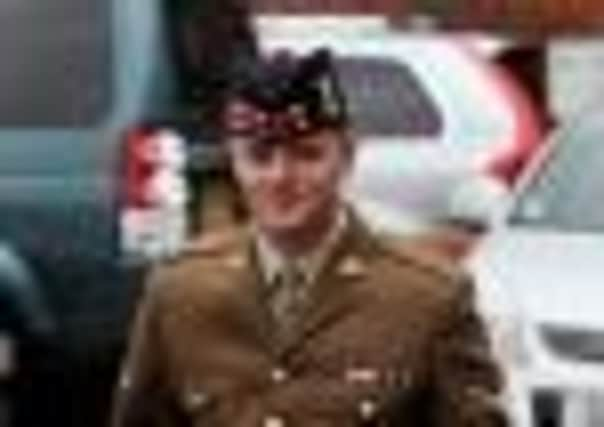Sniper who shot comrade: I’d never fired rifle in dark


Lance Corporal Michael Pritchard, 22, was killed by a gunshot wound to the ribcage, the hearing was told. It is believed to have been fired from a remote observation post, known as a sangar, by Lance Corporal Malcolm Graham, of The Royal Scots Borderers, 1st Battalion the Royal Regiment of Scotland, who thought he was shooting at insurgents digging in the road.
L/Cpl Graham said all of his sniper training took place in daylight hours and he had never used a thermal imaging sight at night before arriving in Afghanistan.
Advertisement
Hide AdAdvertisement
Hide AdHe said he was in bed on 20 December when he was told there were insurgents digging improvised explosive devices (IEDs) into the road and that he would receive a briefing when he got to the remote sangar.
On arrival, he asked section commander Corporal Jonathan Dolton what was happening and was told two men were digging IEDs into the road 700m away, the hearing was told.
He was also told “escalation drills” had been carried out and sentries had fired warning shots with a machine gun.
L/Cpl Graham said: “He (Cpl Dolton) told me there was an observation post in the area and that I had been brought in for accurate fire.”
L/Cpl Graham said he was never given an exact location for the N30 observation post where L/Cpl Pritchard was, and asked Cpl Dolton for more information.
He was told it was on the right-hand side of the road from where the suspected insurgents were digging but that they could not see the observation post from where they were.
L/Cpl Graham asked Cpl Dolton to “get on the radio and confirm there were no friendlies” before he shot and was told there were no soldiers in the area.
He fired several shots and said he could see one of the men struggling to pull the other along the ground, the inquest heard.
Advertisement
Hide AdAdvertisement
Hide AdTwo more people turned up, whom L/Cpl Graham took to be insurgents who had come in to finish off laying IEDs.
He said he took up aim on the two new insurgents and they went to ground. He fired another shot at another insurgent.
L/Cpl Graham said it appeared all four men were lying on the ground and they were still in the road. He told the court that within a minute of him firing his sixth shot, he heard “Man down”.
He said although he knew of the N30 position, he had not been told about the restricted firing line. He said he would have expected an important piece of information like that to come out in a briefing.
L/Cpl Graham told the inquest that had he known the soldiers were there he would never have pulled the trigger. He said: “I had absolutely no doubt, 110 per cent in my mind, I was shooting at insurgents the whole time.”
He said he was confident with everything he was doing and with his kit and equipment.
When asked about L/Cpl Pritchard’s death, he said: “It was a terrible situation. I feel really bad about being involved in it.”
L/Cpl Pritchard was on secondment with 4th Battalion The Rifles, deployed to the observation post N30 on 20 December 2009 to watch a blind spot on an access road, Route 611, in the Sangin area of central Helmand Province. The purpose was to make sure Taleban insurgents did not plant IEDs in the road, the hearing at Eastbourne Town Hall was told.
The inquest was adjourned until Monday.